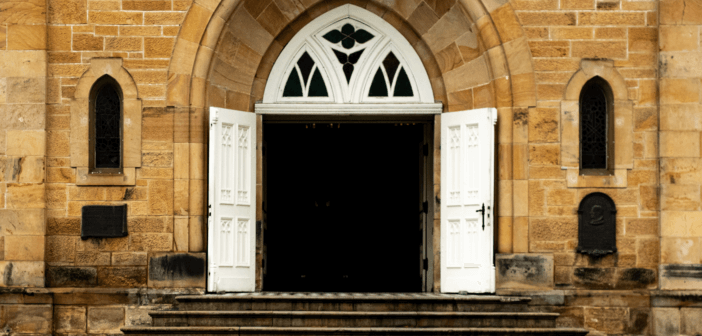Alex Shanks says the question of whether to reopen is different for a church than for other institutions. Rather than just reacting to what others are doing, churches need to model responsible decision making and exceed basic health guidelines to protect the most vulnerable.
Everywhere we turn, people are talking about reopening. Should churches simply follow the same guidelines regarding reopening as other institutions? I believe there are practical principles and theological reasons why reopening our church campuses requires a different kind of thinking. The church shouldn’t be looking to sidestep the guidelines. The church shouldn’t be simply reacting to what others are doing. The church should lead the way by modeling a method of safety for others to follow.
Practical Principles
1. Churches need to open faithfully, not just safely.
Churches will need to consider how the changes required to reopen safely could adversely impact the nature and integrity of worship and ministry. Churches will need to make sure that any expression of worship that requires diligent mitigation still reflects the values and essence of who God has called the church to be. Churches should ask:
- What are the essential worship elements that express who we are and who we believe God to be, and how can we ensure those are done authentically in this new model?
- How can we most faithfully be the church and make disciples of Jesus in this socially distanced church?
The good news is that in the last few weeks we have figured out how to faithfully do the ministry of the church virtually. Figuring out how to faithfully do ministry in a world of social distancing while maintaining virtual church options for those who can’t attend in person will require a new wave of ingenuity and adaptation. Some churches may choose to reopen much later in order to open faithfully.
2. Churches are built primarily on trust.
People don’t regularly attend a church where they don’t trust their leaders to make healthy and informed decisions. If you lose the trust of your congregation during a reopening, you lose an essential glue that holds the organizational life together. One can only imagine the impact of losing the trust of the general public by being the next tragic headline. You may be concerned about people going to the church next door who is opening sooner than you are. In the long run, people will attend churches based on trust and a feeling of safety, rather than when they reopened.
3. Church finances should not be a primary consideration in the timing of reopening.
Reopening the church does not mean there will be an increase in giving. Giving may increase. It may not. This ambiguity makes churches significantly different than businesses who have had no income. How much giving actually comes from loose plate offering? Many churches have gained new giving units through online sources. Be skeptical of those who think reopening church will solve financial issues in the church. Giving levels are more impacted by the changes in the economy, the unemployment rates, and the re-prioritization of family budgets in an uncertain time. If your church is fragile financially, reopening is not likely an immediate solution, especially considering the costs related to reopening safely. Giving will more likely increase as we make faithful decisions about reopening, not because we opened before the church down the street.
4. Reopening churches will require building a new culture.
Churches are notoriously ineffective at getting people to follow new rules and guidelines. Even when we do, we always have an exception. (Picture persons in your family who continue to do things the way they have always done them despite all your efforts to change their habits!) Churches lack an enforcement mechanism and are often too kind for our own good. We need a new culture. This new culture will be marked by a willingness to put the safety of others ahead of our personal preferences and willingness to hold ourselves and others accountable. It will require a culture that is willing to call someone out with love and clarity when they see a new protocol slipping. Safely reopening will only be possible through a mass commitment to new norms and a culture that is constantly asking: “How can we help not be the one to make someone else sick?” The pastor cannot be expected to be the sole guardian of safety. Reopening will require training a cadre of champion leaders who will build a new culture of doing church.
5. We cannot return to the church as it used to be.
That is not possible. Nor is it responsible. To return to the same church we left mid-March would not honor the learnings we have gained and the ways we have adapted. Returning to the way things used to be would fly in the face of the Jesus who warned against pouring new wine into old wineskins. We are creatures of habit and adverse to change, so we will have to make every effort to create a new model of church that is fully inspired by the God who makes all things new. How will we welcome and engage the new people with whom we have connected? How will we incorporate the new technologies? Additionally, how will we honor and give space to express the incredible loss and grief experienced in this time? To return to church as it used to be without acknowledging the grief and loss of this time would be the worst kind of denial in the very place that should be modeling honest and healthy grief work. We all want to go back to church but we cannot go back to the same church we left. Instead of returning to the same church, we should be relaunched as a new church!
Theological Considerations
Beyond these practical principles, there are theological considerations.
1. A church is not primarily a building.
The church is a people on mission together. Unlike others, churches have not been closed, rather we are preparing to reenter our buildings. In this time, we have been the church gathered virtually and distributed in service and mission for others. There is no theological congruence to the way God designed the church if our next steps in being the church are focused only on reopening the facilities we use. There are a variety of ways to connect to God and others prior to reopening of our buildings. We should remain focused on being the church and not just having church worship and ministries on campus.
2. The body of Christ must honor the most vulnerable parts of the body. (1 Corinthians 12).
In many ways, we are called to honor the vulnerable above all others. What does it say theologically about us if we open in a way that excludes the vulnerable? How may we need to adapt when it is the clergyperson who is vulnerable? Didn’t we read somewhere that the first shall be last and the last shall be first? Christ’s primary call is to serve others — especially the vulnerable, the weak, and the poor. Our reopening plans are not about what is best for the management of our institution, but what is best for the common good and greater community. This is not a time to focus primarily on what we may be sacrificing by not gathering, but how we are serving and loving all our neighbors by not gathering too soon.
Seek to Exceed Basic Health Guidelines
Whatever we do, churches should seek to exceed the basic health guidelines. Churches are not the exception. By understanding all the ways that the virus is still spreading, churches can take appropriate steps to mitigate risk. This includes following all the best guidance around limiting the size of gatherings, cleaning practices, social distancing, and the wearing of masks. The church will need to alter elements of worship like receiving communion and the offering, greeting time, and public singing. All of these help to ensure the safety of the vulnerable, our children, and more.
Any church, regardless of size and location, can reopen safely and faithfully if it will thoughtfully take its time, adapt, and innovate. Remember, the church has never closed. The church remains open, even as we don’t physically gather in our building. All of this so that we might fully love our neighbors as we love ourselves.
A more complete version of “Why Reopening a Church is Different” can be found on the website of the Florida Annual Conference.
Related Resources
- Key Questions to Consider Before Resuming In-Person Gatherings, assembled by the Lewis Center
- Get Ready for the New Normal by Doug Powe
- 11 Provocative Thoughts and Questions About What’s Next by Bill Wilson







